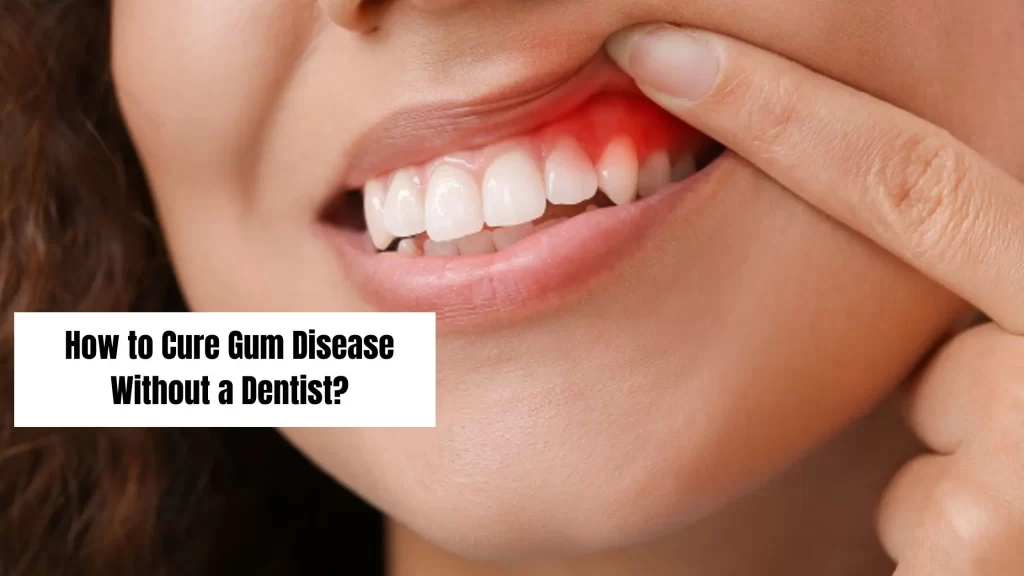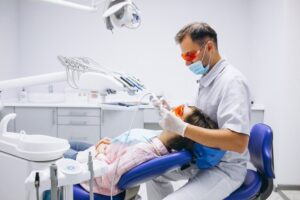
Want to know how to cure gum disease without a dentist? Well, you have landed on the right article.
Resolving gum disease is crucial, and taking proactive steps at home is as vital as seeking professional dental treatment. It is essential to learn effective ways to treat gum disease without relying solely on a dentist’s intervention.
Causes
Gum disease typically originates from inadequate oral hygiene practices. Plaque accumulates on your teeth on a daily basis, but if you fail to brush and floss properly, it can amass and lead to the early stages of gum disease. If left untreated, plaque can calcify and become tartar, requiring professional dental cleaning for its removal. Timely intervention is necessary to prevent this progression. Therefore, maintaining excellent oral hygiene serves as your primary and most crucial defense against gum disease.
In addition to insufficient oral care, gum disease can be caused by or associated with the following factors:
- Certain medications
- Conditions like Crohn’s disease, diabetes, and rheumatoid arthritis
- Substance abuse
- Dry mouth
- Family history of gum disease
- Hormonal changes
- Immunodeficiency
- Inadequate nutrition
- Insufficient intake of vitamin C
- Smoking and tobacco use
Treatment at Home
Improving your oral hygiene practices can often resolve gingivitis, the early stage of gum disease. Even if professional assistance is required, initiating gum disease treatment at home can still be beneficial. Follow these guidelines for effective at-home gum disease treatment:
- Maintain a brushing routine of two times per day, spending 2 minutes each time to effectively clean your teeth.
- Employ the correct brushing technique to clean below the gum line.
- Ensure your toothbrush is in good condition and replace it every 3 months.
- Use toothpaste recommended by your dentist.
Floss properly once a day, ensuring the floss reaches and embraces each tooth.
If you are already following these steps, consider modifying other daily habits. Stay hydrated by consuming ample water and avoid foods and beverages that can harm your teeth and gums. Additionally, if you use tobacco products, quitting immediately is advised.
Certain home remedies can also aid in gum disease management. Rinsing with salt water can help reduce harmful bacteria that contribute to inflammation and irritation of the gums. Drinking green tea, which is rich in antioxidants, may help alleviate inflammation. However, relying solely on home remedies for gum disease is not recommended. Seeking guidance from a dentist is crucial to receive appropriate and effective treatment. Consulting a dentist is essential for proper care.
How to cure gum disease without a dentist
Treating gum disease requires different approaches depending on its severity. Gingivitis, which is a mild gum disease, can often be addressed with improved oral hygiene practices at home. On the other hand, periodontitis, which is more severe, usually requires a combination of enhanced home care and professional dental intervention. Advanced periodontitis, characterized by significant bone and tissue damage, necessitates more aggressive treatment. Here’s what you can expect for each stage:
Mild gum disease (Gingivitis):
Gingivitis is typically characterized by gum inflammation, irritation, and bleeding during brushing and flossing. Treatment for all forms of gum disease generally begins at this stage and involves:
- Improved brushing and flossing techniques
- Use of better oral care products
- Consistent oral care habits
- Dietary improvements and proper hydration
- Smoking cessation
Moderate to Severe gum disease:
At this stage, you may experience bone and tissue loss, leading to gum pockets, tooth looseness, and changes in your bite. Additional treatments typically include:
- Professional deep cleaning at the dentist’s office known as “scaling and root planing.” Scaling involves removing tartar both above and below the gum line, includin犀利士
g from pockets. Root planing involves smoothing the tooth’s root surface to impede bacterial attachment.
Advanced gum disease:
With advanced gum disease, irreversible damage to the supporting bone and tissue fibres can occur, resulting in teeth shifting and loosening. Without prompt and aggressive treatment, tooth loss may ensue. Treatment options may include:
- Antibiotic or antimicrobial rinse or topical medication
- Bite adjustment to protect loose or shifting teeth
In cases where these interventions prove ineffective due to the advanced stage of gum disease, surgical intervention might be necessary. Therefore, it is crucial to initiate gum disease treatment as soon as the initial signs are observed. If professional dental care is not immediately accessible, you can still start addressing the problem at home.
When to See a Doctor?
Regular dental visits, ideally every six months, are important for monitoring gum disease and receiving necessary treatments. If gum disease is more than mild, you may require dental cleanings every three or four months until it is brought under control. It is advisable to schedule an appointment with your dentist if you suspect any gum health issues, as early detection makes treatment easier. Preventing gum disease in the first place is preferable to seeking a cure.
Conclusion
In conclusion, how to cure gum disease without a dentist? This exploration of managing gum disease independently, it’s evident that a proactive approach to oral health can yield significant results. By embracing natural remedies and diligent self-care practices, individuals can take charge of their gum health without solely relying on a dentist. Remember, consistent oral hygiene, proper nutrition, and lifestyle adjustments play pivotal roles in preventing and addressing gum disease. Empowered with this knowledge, you can embark on a journey towards healthier gums and a brighter smile, all while prioritising your oral well-being.
FAQ
Q1: What are the symptoms of gum disease?
Ans: Symptoms of gum disease include red, swollen gums, bleeding during brushing/flossing, and bad breath.
Q2: How is gum disease diagnosed?
Ans: Dentists diagnose gum disease through a visual examination, probing of gum pockets, and X-rays if needed.
Q3: Can gum disease be reversed?
Ans: In its early stages (gingivitis), gum disease can be reversed with improved oral hygiene and professional care.
Q4: Are there home remedies for gum disease?
Ans: Saltwater rinses and green tea consumption may provide some relief, but professional treatment is necessary.
Q5: What happens if gum disease is left untreated?
Ans: Untreated gum disease can lead to tooth loss, gum recession, and potential complications in overall health.








